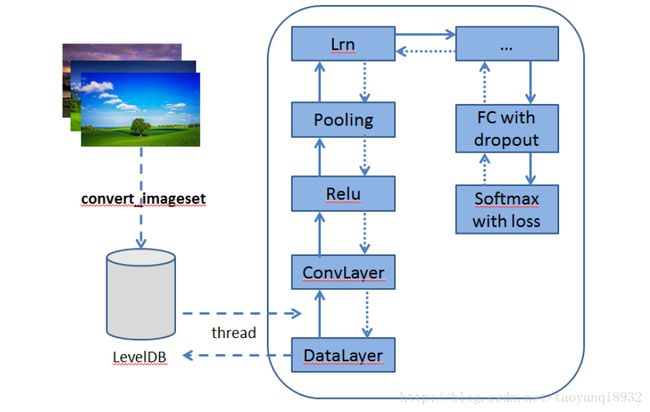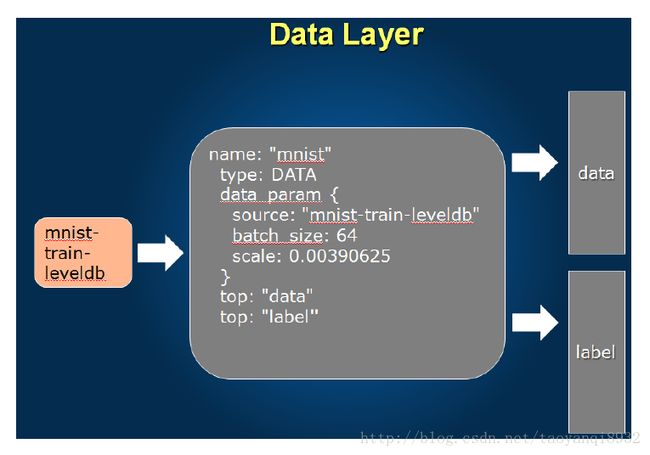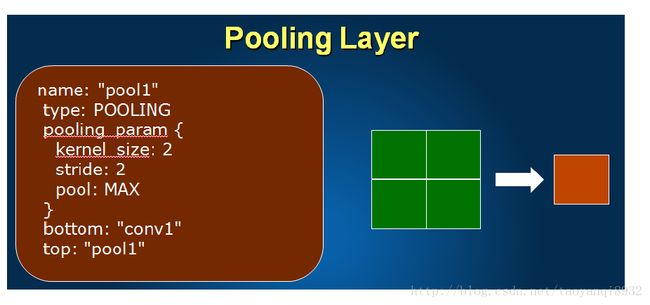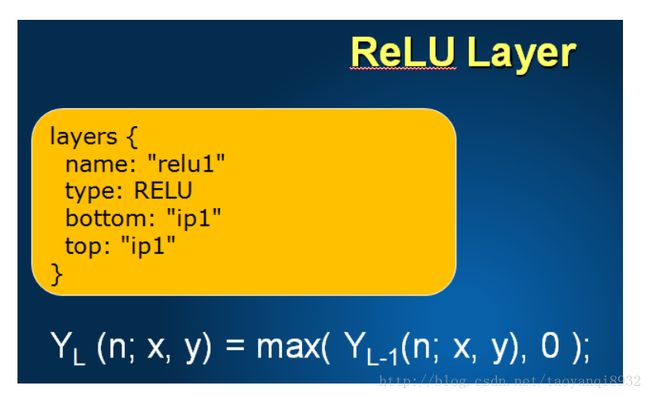Caffe学习-手写数字识别
1. Caffe训练方法综述
caffe非常简单,训练时只需写prototxt文件即可,其大致的步骤为:
- Resize图片,转换存储格式(LMDB/LevelDB)
- 定义网络结构(编辑prototxt)
- 定义solver(编辑另一个prototxt)
- 一行命令开始训练(可以基于已有的权重赋值)
如下图所示,其训练的过程,关于卷积神经网络(CNN)可以参考:计算机视觉与卷积神经网络
下面对手写数字识别进行训练。
2. MNIST数据集
mnist是一个大型的手写数字库,其包含60000个训练集和10000个测试机,每张图片已经进行了尺度归一化等操作,因此可以直接拿过来使用。
下载
可以在Caffe源码框架的/data/mnist下执行,如果没有安装Caffe,请参考:linux(ubuntu)下安装深度学习框架caffe
cd data/mnist
./get_mnist.sh下载后可以看到其文件:
yqtao@yqtao:~/caffe/data/mnist$ tree
.
├── get_mnist.sh
├── t10k-images-idx3-ubyte
├── t10k-labels-idx1-ubyte
├── train-images-idx3-ubyte
└── train-labels-idx1-ubyte注意:下载后的文件需要转换存储格式为LEVELDB或LMDB,这要做有两个原因:
- 转换成统一的格式可以简化数据读取层的实现
- 提高磁盘I/O的利用率
转换格式
// 执行命令
yqtao@yqtao:~/caffe$ ./examples/mnist/create_mnist.sh 这要会在example/mnist产生 mnist_test_lmdb和mnist_train_lmdb两个目录分别存放测试集和训练集。
3. 定义层次结构
这是非常重要的一步,但是其完全是模板话的定义,如下图所示为LeNet-5模型所定义的CNN:
这张图非常的重要,有了它,编写后面的网络结构就好非常的清晰了。
关于上图的结构是写到.prototxt文件中的,其文件描述在
/example/mnist/lenet_train_val.prototxt中。
数据层
数据层的图示:
1 name: "LeNet" //Net的名称
2 layer {
3 name: "mnist"
4 type: "Data" //表明为数据层
5 top: "data" //top,表示输出
6 top: "label"
7 include { //只在训练时有效
8 phase: TRAIN
9 }
10 transform_param {
11 scale: 0.00390625 //数据变化缩放因子
12 }
13 data_param { //数据层的参数
14 source: "examples/mnist/mnist_train_lmdb" //来源
15 batch_size: 64 //一次读取64张图片
16 backend: LMDB //数据格式
17 }
18 }卷积层
卷积层的图示:
如下卷积层的定义:
36 layer {
37 name: "conv1"
38 type: "Convolution"
39 bottom: "data" //上一层的输出,这一层的输入
40 top: "conv1" //这一层的输出
41 param { //学习率
42 lr_mult: 1
43 }
44 param {
45 lr_mult: 2
46 }
47 convolution_param {
48 num_output: 20 //也就是depth
49 kernel_size: 5 //核的大小5*5
50 stride: 1 //步长1
51 weight_filler { //权值初始方式
52 type: "xavier"
53 }
54 bias_filler {
55 type: "constant"
56 }
57 }
58 }注意:在top,和bottom中一定不要写错了!
池化层
池化层图示:
其定义如下:
59 layer {
60 name: "pool1"
61 type: "Pooling"
62 bottom: "conv1"
63 top: "pool1"
64 pooling_param {
65 pool: MAX //下采样的方法
66 kernel_size: 2 //窗口
67 stride: 2 //步长
68 }
69 }全链接层
其定义如下:
104 layer {
105 name: "ip1"
106 type: "InnerProduct"
107 bottom: "pool2"
108 top: "ip1"
109 param {
110 lr_mult: 1
111 }
112 param {
113 lr_mult: 2
114 }
115 inner_product_param {
116 num_output: 500
117 weight_filler {
118 type: "xavier"
119 }
120 bias_filler {
121 type: "constant"
122 }
123 }
124 }激励层
其图示如下:
定义如下:
125 layer {
126 name: "relu1"
127 type: "ReLU"
128 bottom: "ip1"
129 top: "ip1"
130 }损失层
定义如下:
162 layer {
163 name: "loss"
164 type: "SoftmaxWithLoss"
165 bottom: "ip2"
166 bottom: "label"
167 top: "loss"
168 }注意:计算损失的时候的输入为label为数据层的一个输出,和全连接层的输出ip2,这一层的输出为loss。
4. 定义超参数文件
有了上面的网络结构的文件后还需要一个solver.prototxt的文件,其指定了训练的超参数。
其文件目录在example/mnist/lenet_solver.prototxt,每一项都有详细的解析。
1 # The train/test net protocol buffer definition
2 net: "examples/mnist/lenet_train_test.prototxt"
3 # test_iter specifies how many forward passes the test should carry out.
4 # In the case of MNIST, we have test batch size 100 and 100 test iterations,
5 # covering the full 10,000 testing images.
6 test_iter: 100
7 # Carry out testing every 500 training iterations.
8 test_interval: 500
9 # The base learning rate, momentum and the weight decay of the network.
10 base_lr: 0.01
11 momentum: 0.9
12 weight_decay: 0.0005
13 # The learning rate policy
14 lr_policy: "inv"
15 gamma: 0.0001
16 power: 0.75
17 # Display every 100 iterations
18 display: 100
19 # The maximum number of iterations
20 max_iter: 10000
21 # snapshot intermediate results
22 snapshot: 5000
23 snapshot_prefix: "examples/mnist/lenet"
24 # solver mode: CPU or GPU
25 solver_mode: CPU5. 训练
首先了解build/tools/caffe.bin的用法,如下所示:
yqtao@yqtao:~/caffe$ ./build/tools/caffe.bin
caffe.bin: command line brew
usage: caffe
commands:
train train or finetune a model
test score a model
device_query show GPU diagnostic information
time benchmark model execution time
Flags from tools/caffe.cpp:
-gpu (Optional; run in GPU mode on given device IDs separated by ','.Use
'-gpu all' to run on all available GPUs. The effective training batch
size is multiplied by the number of devices.) type: string default: ""
-iterations (The number of iterations to run.) type: int32 default: 50
-level (Optional; network level.) type: int32 default: 0
-model (The model definition protocol buffer text file.) type: string
default: ""
-phase (Optional; network phase (TRAIN or TEST). Only used for 'time'.)
type: string default: ""
-sighup_effect (Optional; action to take when a SIGHUP signal is received:
snapshot, stop or none.) type: string default: "snapshot"
-sigint_effect (Optional; action to take when a SIGINT signal is received:
snapshot, stop or none.) type: string default: "stop"
-snapshot (Optional; the snapshot solver state to resume training.)
type: string default: ""
-solver (The solver definition protocol buffer text file.) type: string
default: ""
-stage (Optional; network stages (not to be confused with phase), separated
by ','.) type: string default: ""
-weights (Optional; the pretrained weights to initialize finetuning,
separated by ','. Cannot be set simultaneously with snapshot.)
type: string default: "" 则进行训练的命令为:
//执行命令
./build/tools/caffe train --solver=examples/mnist/lenet_solver.prototxt其中solver=examples/mnist/lenet_solver.prototxt为指定的超参数文件。
运行部分结果如下:
I0311 17:43:26.273123 16205 sgd_solver.cpp:106] Iteration 9900, lr = 0.00596843
I0311 17:43:34.746616 16205 solver.cpp:454] Snapshotting to binary proto file examples/mnist/lenet_iter_10000.caffemodel
I0311 17:43:34.758142 16205 sgd_solver.cpp:273] Snapshotting solver state to binary proto file examples/mnist/lenet_iter_10000.solverstate
I0311 17:43:34.799706 16205 solver.cpp:317] Iteration 10000, loss = 0.00373883
I0311 17:43:34.799777 16205 solver.cpp:337] Iteration 10000, Testing net (#0)
I0311 17:43:40.162556 16205 solver.cpp:404] Test net output #0: accuracy = 0.9914
I0311 17:43:40.162638 16205 solver.cpp:404] Test net output #1: loss = 0.0260208 (* 1 = 0.0260208 loss)
I0311 17:43:40.162645 16205 solver.cpp:322] Optimization Done.
I0311 17:43:40.162649 16205 caffe.cpp:254] Optimization Done.可以看到,最终的训练模型的权值保存在
examples/mnist/lenet_iter_10000.caffemodel
训练的状态保存在
examples/mnist/lenet_iter_10000.solverstate
6. 验证
执行下面的命令,指定命令test,参数网络定义的位置和权值的位置即可。
yqtao@yqtao:~/caffe$ ./build/tools/caffe.bin test \
> -model examples/mnist/lenet_train_test.prototxt \
> -weights examples/mnist/lenet_iter_10000.caffemodel \
> -iterations 100运行结果如下:
0311 17:49:28.120023 16423 caffe.cpp:308] Batch 96, accuracy = 0.97
I0311 17:49:28.120096 16423 caffe.cpp:308] Batch 96, loss = 0.0561079
I0311 17:49:28.174964 16423 caffe.cpp:308] Batch 97, accuracy = 0.98
I0311 17:49:28.175036 16423 caffe.cpp:308] Batch 97, loss = 0.0847761
I0311 17:49:28.229038 16423 caffe.cpp:308] Batch 98, accuracy = 1
I0311 17:49:28.229110 16423 caffe.cpp:308] Batch 98, loss = 0.00344597
I0311 17:49:28.286336 16423 caffe.cpp:308] Batch 99, accuracy = 1
I0311 17:49:28.286495 16423 caffe.cpp:308] Batch 99, loss = 0.00835868
I0311 17:49:28.286504 16423 caffe.cpp:313] Loss: 0.0260208
I0311 17:49:28.286516 16423 caffe.cpp:325] accuracy = 0.9914
I0311 17:49:28.286526 16423 caffe.cpp:325] loss = 0.0260208 (* 1 = 0.0260208 loss)最终的精确度为accuracy = 0.9914.
7. 总结
转换存储格式(
LMDB/LevelDB)定义网络结构(编辑
prototxt)定义
solver(编辑另一个prototxt)学习使用
caffe.bin命令的使用






